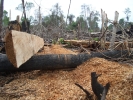 Asia Pulp and Paper (APP), Indonesia’s largest pulp and paper company, is still linked to forest destruction, according to new mapping analysis completed by Greenpeace International. Almost 8,000 hectares of forest and peatland has been cleared since 2013 in two concessions which are linked to APP and its parent company the Sinar Mas Group. Greenpeace International put these allegations to APP / Sinar Mass, and the group failed to provide a credible response or to take meaningful action. As a result, Greenpeace has ended all further engagement with APP/Sinar Mas.
Asia Pulp and Paper (APP), Indonesia’s largest pulp and paper company, is still linked to forest destruction, according to new mapping analysis completed by Greenpeace International. Almost 8,000 hectares of forest and peatland has been cleared since 2013 in two concessions which are linked to APP and its parent company the Sinar Mas Group. Greenpeace International put these allegations to APP / Sinar Mass, and the group failed to provide a credible response or to take meaningful action. As a result, Greenpeace has ended all further engagement with APP/Sinar Mas. APP became the world’s most notorious pulp and paper company after years of forest destruction and links to human rights abuses. In 2013 the company committed to end its role in deforestation and introduced new conservation commitments. For the past several years the company has been aggressively marketing itself to customers as a champion for zero deforestation and a supplier of sustainable products.
“For the past five years, Greenpeace has been advising and inputting into APP’s FCP implementation process.” says Greenpeace “New analysis by Greenpeace International of satellite imagery and company deeds indicates that companies connected with APP/Sinar Mas have cleared almost 8,000 hectares of forest and peatland over this same time period.”
Greenpeace has been criticised for having provided APP a shield from criticism while the company was dramatically expanding its production capacity and building a pulp and paper mill on the island of Sumatra, that is among the world’s largest and significantly increases demand for wood.
An investigation run by the Associated Press in December 2017 revealed that APP plantations, often disguised as “independent” by opaque corporate structure, are still linked with deforestation and forest fires.
Yesterday, Foresthints.news revealed that another APP subsidiary, PT BMH, expanded its acacia plantations on peatland over an area equivalent to around 500 soccer fields. This included areas targeted by Indonesia’s Peat Restoration Agency for peat recovery, as they had been burned in the devastating fires of 2015. The company also built more than 37 kilometers of new drainage canals.
Building new drainage canals and expanding on peat is now forbidden according to the new peat regulations. National policies were put in place because expansion of peat clearance and drainage is a major source of CO2 emissions and creates conditions on the ground that makes fire impossible to control. According to a recent EPN paper , APP alone is responsible annually for almost 44 million tonnes of CO2 emissions from its plantations on dried peat, an amount nearly as much as the country of Norway.


